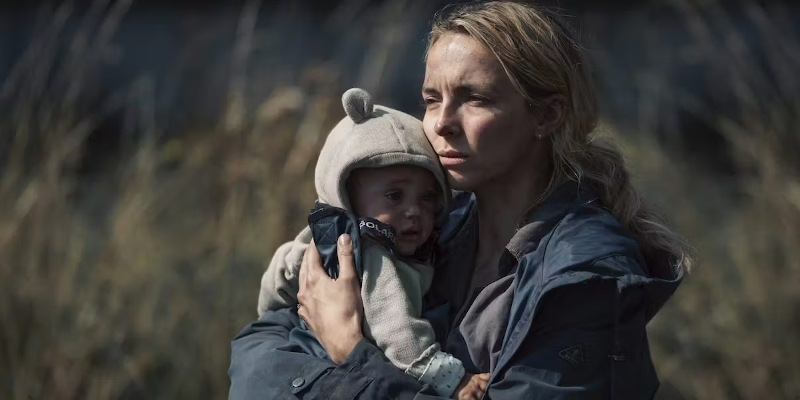Director – Mahalia Belo – 2023 – UK – Cert. 15 – 102m
***1/2
As parts of the UK are flooded and submerged by an ecological disaster, a woman births a baby she must then bring up – on Digital from Monday, March 4th following its release in UK cinemas on Friday, January 19th
On the one hand, this starts off with a woman (Jodie Comer) giving birth and then experiencing the process of being a new mother, with all the joys and stresses that entails. On the other, this shows the UK being overtaken and flooded by an eco-disaster, and how people respond to that situation both individually and en masse. The second scenario is reminiscent of any number of disaster and / or science fiction movies about flooding, apocalypse or dystopia (When Worlds Collide, Rudolph Maté, 1951; Children of Men, Alfonso Cuarón, 2006; Waterworld, Kevin Reynolds, 1995): if you approach this movie expecting something like that, you’re going to be disappointed, because although that element is very much present in the film, it’s little more than the backdrop.
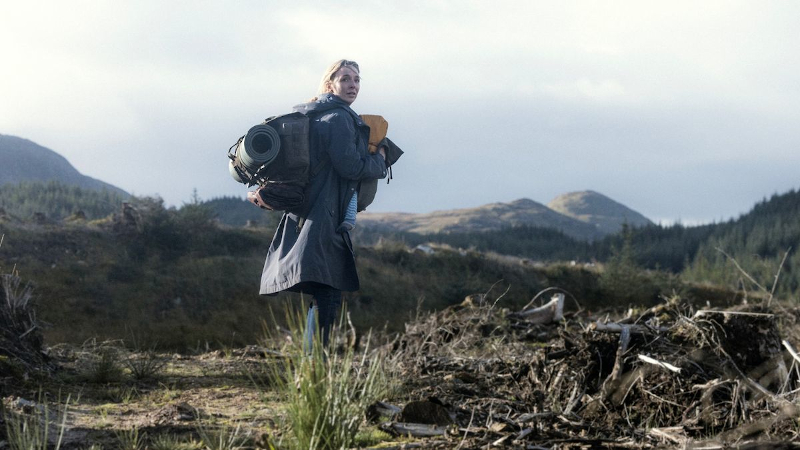
It plays more like a road movie, in which the heroine – the husband having dropped out of the narrative towards the end of the first reel – meets a series of people on her travels, each of whom offer their own individual insight into the state of things and how the new mother might move forward. There have been eco-disaster / dystopian movies before (Mad Max, George Miller, 1979; The Road, John Hillcoat, 2009; Monsters, Gareth Edwards, 2010) but they tend to focus on the issue of survival in a post-apocalyptic world. They also tend to be very male-centric. The End We Start From is attempting something very different.
The book it’s based on, by mother of two Megan Hunter, is essentially a heavily poetic meditation on the female experience of birth and motherhood. The eco-disaster is there in the background, but it’s not really the central subject matter. The screen adaptation of a book that was never conceived of as cinematic is by Alice Birch, who has turned it into something workable in film production terms.
On a broad level, it’s not hard to make connections between the birthing process and such elements as water, barriers breaking, water cascading, swimming, immersion, baptism. And if (as is done, perhaps a little too obviously at the start) you juxtapose such images, they sit well beside each other. Indeed, this is so blatant and obvious when you experience it during the film’s opening that you feel that you’re watching a cliché or a trope, yet it’s one that hasn’t been widely articulated in the movies or anywhere else to the best of my knowledge. These are ideas that would cry out to be explored by the late, water-obsessed director Andrei Tarkovsky, were he still alive. Sadly, the current film never reaches – nor does it even aspire to – anything on that level.
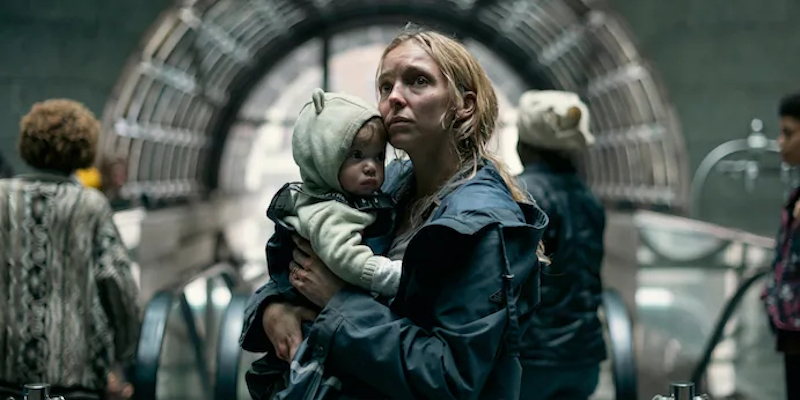
The birthing woman / mother is never named, nor are most of the characters in the script beyond being designated with a letter or letters, a naming system presumably lifted from the book. She doesn’t initially encounter her husband (Joel Fry) so much as he is simply there as a presence, helping her though rain / birth / hospital in London, and the drive to his parents’ house somewhere in the country which involves running as gauntlet of gridlocked traffic (these are Londoners well enough off to be car owners) and towns and villagers closed to non-residents. They stay at his parents (Mark Strong, Nina Sosanya) until the food runs out, disaster strikes and the couple and their baby must move on.
Food distribution is organised and camps have been set up, patrolled by British army soldiers, for the homeless. This element is cleverly realised so that it feels not like something out of science-fiction, but like the sort of event one might see on the TV news, so you never question its veracity. The shelter they reach turns out only to be able to accept a baby and one parent, so she moves in there with the infant while he must move on, although he does reappear from time to time as either flashback (how they met) or a presence that she can’t get out of her head. There are moments when she sees him like this that you wonder whether he’s just died.
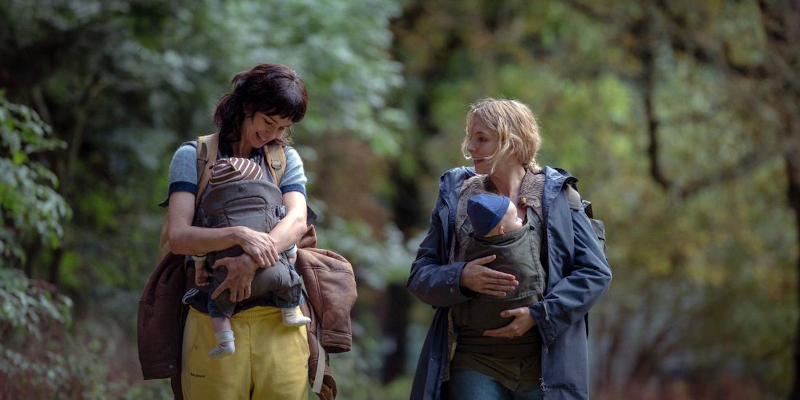
At the refuge, she falls in with another mum (Katherine Waterston), and her five-month-old, and for a while the proceedings take the female buddy movie route as the pair (foursome) travel through the narrative together after events force them to leave the camp, and they take on an objective, to get to a commune set up before the current situation by a woman who owns an island off the South coast, but when they get there, our heroine finds herself at odds with the isolationist commune head (Gina Mckee) who wants no-contact with the outside world whatsoever, not even radio reception. Having heard in one such that the authorities are attempting to get London back on its feet, she resolves to return there and see what the future brings, the narrative returning to the journey of her and her baby rather than her in the company of someone else.
At some point during the above, she runs into a kindly man (Benedict Cumberbatch) who has also suffered greatly during the eco-disaster and its aftermath and who, making no demands, offers her and baby shelter for the night. Much alcohol is consumed, and much wild dancing ensues into the night; a momentary respite from all the hardships everyone here must endure.
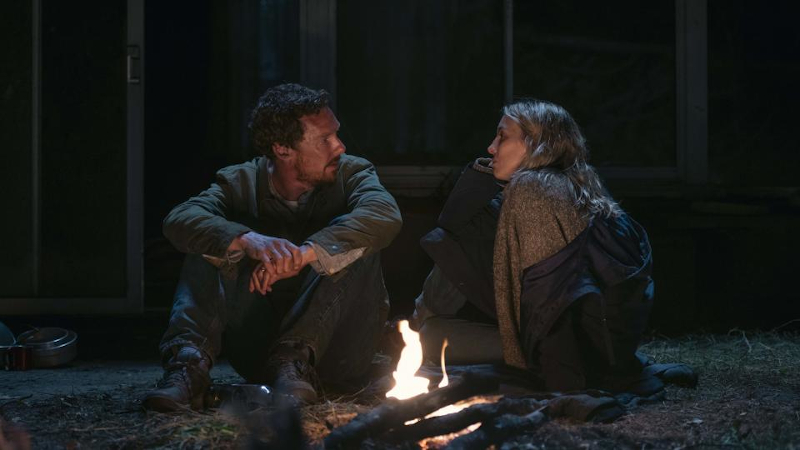
If the piece is heavily episodic in nature, it constantly engages the audience. It could so easily have slipped into mawkish, mother and baby sentiment at any moment, but, mercifully, it never does. The woman (or women) find themselves in a number of difficult situations from which they must swiftly extract themselves, and at one point the tables are suddenly switched as our heroine acts ruthlessly and unjustly towards others.
This is the English in survival mode, the devil take the hindmost, and it’s not a pretty sight. It’s a wake-up call for this country to get itself out before a disaster like this strikes. (I’m not sure how true it is either: the pandemic suggested that on a local, communal level the British have a great capacity for kindness to one another. But then, that wasn’t a scenario of comms breaking down and food running out, which this one is.)
Big, special effects sequences are few and far between, but the few that there are prove highly effective. The trailer gives a fair representation of the film.
In short, less the eco-disaster or dystopian movie you might expect, more a female, mother and baby road movie. An attempt to do something different, and a moderately successful one too.
The End We Start From is on Digital from Monday, March 4th following its release in UK cinemas on Friday, January 19th.
Trailer:
